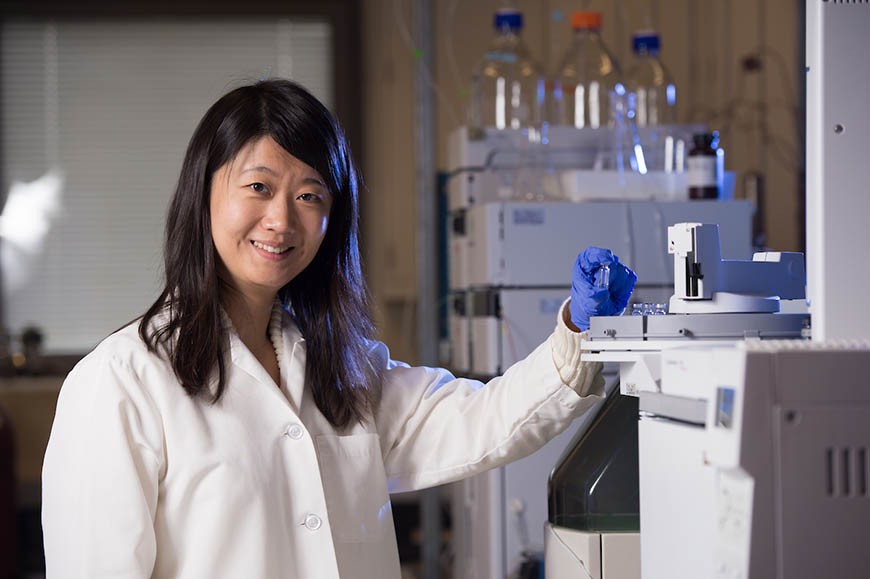Assistant Professor Wenqing Xu Takes Lead on $1.46M Research Project to Address Explosive Residuals at Military Training Sites

Dr. Wenqing Xu
As an early career STEM researcher, how do you top a $500,000 National Science Foundation CAREER grant? If you’re Villanova University’s Dr. Wenqing Xu, you earn a $1.46 million project award from the Department of Defense. In one year’s time, this Assistant Professor of Civil and Environmental Engineering has secured funding that most faculty only dream of. In January 2019, Dr. Xu learned that she and a multi-institutional team of researchers had received a Strategic Environmental Research and Development Program (SEDRP) grant for “Optimizing Carbon Amendments that Simultaneously Adsorb and Transform Legacy and Insensitive High Explosives.”
In November, SEDRP, the DoD’s environmental science and technology program, planned and executed in partnership with the Department of Energy and Environmental Protection Agency, released a call for proposals that included “Innovative Treatment Options to Mitigate Munitions Constituent Transport on DoD Testing and Training Ranges.” Acknowledging that she’d wanted to apply for this grant “for a very long time,” Dr. Xu and her team were successful in presenting an innovative proposal to address explosive residuals at military training sites.
“The DoD is replacing legacy explosives, like TNT, with new insensitive high explosives (IHE) whose compounds are less sensitive to shock and safer to transport,” explains Dr. Xu. The downside, however, is that many IHE are highly water-soluble and can easily migrate from soil to water, representing a significant source of contamination to ground and surface waters at DoD ranges. Therefore, there is a pressing need to maximize the sorption of explosives, minimize their transport from DoD sites, and promote their decay whenever possible. An expert in pyrogenic carbonaceous matter, Dr. Xu says, “The central objective is to design and optimize PCM in ways that facilitate these objectives.” This project will first identify structural features of both the residues and the carbons that will facilitate hydrolysis, and then develop tailored carbons that will accelerate hydrolysis. Gaining a fundamental understanding of this novel surface process has the potential to transform the field of explosive remediation.
While Dr. Xu is serving as lead principal investigator on the three year project, she acknowledges the unique set of skills that her co-performers bring to the table. Creating the synergy that will contribute to the team’s success are Dr. Joseph Pignatello of the Connecticut Agricultural Experiment Station, Dr. Paul Tratnyek of Oregon Health & Science University, Dr. Eric Bylaska of the DOE’s Pacific Northwest National Laboratory and Dr. Samuel Beal of the U.S. Army Corps of Engineers. Given their individual specialties, the project will involve both experimental and computational research. In addition to the multi-institutional team, the project will support one Villanova PhD student, a post-doc and a number of the College’s undergraduates—presenting students with an exciting opportunity to contribute to real-world research.
“I give the DoD credit for proactively taking on this issue before these explosives are used in active warfare,” says Dr. Xu. “They are looking for real solutions that can be implemented in the near future.” If all goes according to plan, that solution will be an optimized PCM that is inexpensive and easy to deploy as amendments on DoD ranges, maximizing the sorption/degradation of legacy explosives and IHE, minimizing their transport, and mitigating their harmful impact on the environment.
In 2018, Dr. Wenqing Xu was awarded the NSF CAREER grant for “Transforming the Synergistic Interactions between Pyrogenic Carbonaceous Matter (PCM) and Sulfur Species into Solutions for Contaminant Detoxification.” Less than a year later, she was named co-PI on a $101,153 Renmatix, Inc. research grant, led by Civil and Environmental Engineering colleague Dr. Metin Duran, to develop an anammox-biochar system for one step, sustainable and cost-effective nitrogen removal and phosphorus recovery from wastewater. The 2019 DoD grant is Dr. Xu’s third funding award in just 12 months.
